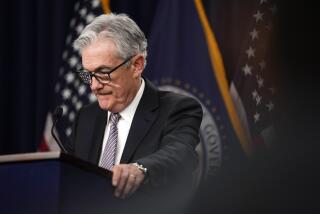Germany Raises Key Discount Rate : Action Meant to Push Mark Higher, Dampen Inflation
- Share via
FRANKFURT — West Germany said Thursday that it would push up its important discount rate to 3% in order to staunch an outflow of capital and dampen a risk of higher inflation.
The West German central bank, the Bundesbank, said the key rate, which has been held at a record low 2.5% since last autumn, will be raised today.
By providing a better return on deutsche mark assets, the Germans now hope to make them more attractive to international investors, which should help reverse the outflow of international money and push up the mark.
The West German currency has fallen about 7% against a rebounding dollar in the past few weeks. A higher mark will also help reduce the cost of imports and keep down inflationary pressures.
Interest rate rises were also announced in Austria, Belgium, the Netherlands and Switzerland--which tend to act in tandem with West Germany. The Bank of England pushed up its bank rates on Tuesday.
But the Bank of France did not join the trend and held its key intervention rate at 7%. French Finance Minister Pierre Beregovoy told reporters that he was still hoping to lower French interest rates.
The U.S. Federal Reserve added reserves into the banking system Thursday, in a move that some analysts said was aimed at signaling that the Fed was not planning its own rise in rates. By adding cash, the Fed puts downward pressure on interest rates.
Interest rate changes are a hot issue in the politics of global economic management. They can send money flowing abruptly from one industrial economy to another and also, if set too high, stifle economic expansion by pinching consumer spending.
The Bundesbank said measures taken to ease credit and fire up the economy, to help avoid a global slump just after the “Black Monday” Oct. 19 financial crash, were no longer needed.
More to Read
Inside the business of entertainment
The Wide Shot brings you news, analysis and insights on everything from streaming wars to production — and what it all means for the future.
You may occasionally receive promotional content from the Los Angeles Times.










